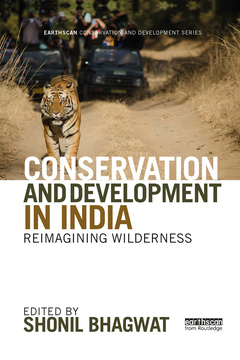Conservation and Development in India Reimagining Wilderness Earthscan Conservation and Development Series
Coordonnateur : Bhagwat Shonil

Despite decades of efforts to integrate conservation and development, India is torn between two very different worldviews of peoples? place in the country?s natural environment. This book takes a critical look at nature conservation and poverty alleviation in India. It opens up discussion of the conservation?development nexus in a country that stands at a major crossroads, where forces of neoliberalism, globalisation and urbanisation are driving the future of India?s environment.
As the book shows, conservation in India is increasingly concerned with creating ?theme parks? ? inviolate, albeit isolated, spaces for wild nature, whereas development is concerned with fast-tracking the construction of built infrastructure while also rolling out nationwide welfare programmes ? promising food, clothing and shelter for the poorest of the poor living in rural India. Conservation and development therefore have very different motivations and attempts to find a common ground have been fraught with challenges. This has been particularly so on the fringes of wildlife parks, where the rural poor come in frequent contact with wild animals to the detriment of both people and wildlife.
Chapters are written by leading scholars on India to provide a vision of the future of Indian nature conservation. Whilst focused on India, the book will also be of interest to scholars and researchers of conservation and development more globally. As a ?rising power?, the world?s eyes are set on India?s development trajectory and there is unprecedented interest in the course of development that the world?s largest democracy takes in the decades to come.
1. Introduction: Conservation and development in India 2. The impact of the Anthropocene in the locality: Eastern India in the nineteenth and twentieth century 3. For the Environment against Conservation: Conflict between renewable energy and biodiversity protection in India 4. Species and Sites Matter: Understanding Human-Wildlife Interactions from 5000 surveys in India 5. Thinking like an Elephant, looking beyond protected areas 6. Biodiversity in Community-managed Landscapes: A View of Potential and Constraints in the Van Panchayats of Kumaon Himalayas 7. Mapping Landscapes: History, Culture and Local Knowledge in Biligiri Rangaswamy Temple Wildlife Sanctuary, India 8. Conservation and Development: Beyond National Parks and Sanctuaries 9. Ficus to Filter: Understanding complexities of market incentives for conserving biodiversity on private lands 10. Conclusions: Reimagining wilderness
Shonil Bhagwat is an academic at the Open University, UK. As an interdisciplinary scholar with a background in natural and social sciences, his research interests centre on the links between environment and development. His research addresses the perceived grand environmental challenges within the context of growing discussion on the Anthropocene, the age of humans. He was previously Course Director of the MSc in Biodiversity, Conservation and Management at the University of Oxford, UK. He has DPhil and MSc degrees from the University of Oxford, and MSc and BSc degrees from the University of Pune, India.
Date de parution : 06-2020
15.6x23.4 cm
Date de parution : 01-2018
15.6x23.4 cm
Thèmes de Conservation and Development in India :
Mots-clés :
Tamil Nadu; Attribution Share Alike; Leaf Litter Collection; Van Panchayats; Joint Forest Management; East Kolkata Wetlands; Human Wildlife Interactions; CRZ Notification; Rainforest Alliance’s Certification; Creative Commons Attribution Share Alike; Human Wildlife Conflict; Eastern Ghats; Bonnet Macaque; Tiger Reserve; Coffee Growers; AICc Weight; Protected Area Designations; Young Man; Small Hydropower Project; Wind Power Project; Livestock Loss; Saranda Forest; Wind Mill; PA Network; Community Conserved Areas



